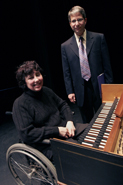Culture and media in early modern Europe
Culture and media in early modern Europe McGill University
User Tools (skip):
Culture and media in early modern Europe

Musician Rachelle Chiasson-Taylor and MaP director Paul Yachnin
Owen Egan
It was a time to celebrate both spring's arrival and the launch of McGill's new MaP Project. On May l2, Moyse Hall was filled with the tinkling sounds of harpsichord music, scholars quoting Shakespeare and talk of how art and culture both change society and are changed by their audience.
Paul Yachnin, Tomlinson Professor of Shakespeare Studies and the director of MaP (Making Publics: Media, Markets and Association in Early Modern Europe, 1500—1700), explained that the project's goal was to create a "metaphorical map" of early modern society that would "locate all the most significant sites of artistic and intellectual activity [in relation to] sites of power, such as royal courts and established churches." This series of maps would be able to explain the development of a "massive, progressive, democratizing push into modernity."
Yachnin used Shakespeare's work as an example of this theory. He believes that Shakespeare's audience evolved into a kind of voluntary community, which differed from the traditional groupings of family, class or guilds. This voluntary community emphasized shared tastes and the desires of individuals and was open to anyone with similar interests. This cultural egalitarianism may have foreshadowed democracy in the political realm.
Yachnin explained the MaP Project features an international and interdisciplinary team of over 30 scholars. Funding for the project is divided between a $2.5 million grant from the Social Sciences and Humanities Research Council of Canada (SSHRCC) and $60,000 a year from McGill. Francois Simard, the assistant director of the grants program of SSHRCC, who came from Ottawa for the MaP launch, was enthusiastic about the scope of the project and said, "It was one of the best projects submitted." Renowned scholar Kathleen McLuskie who is the director of the Shakespeare Institute at Stratford-upon-Avon in England and a member of MaP's Advisory Board, said, "The project will illuminate the fragmented culture of our own time."
Yachnin emphasized that MaP would like to challenge academic isolation. The project, which will be located in the new Espace Renaissance on Peel Street, will involve the public by staging arts festivals integrating music, theatre and scholarly conversation in Montreal and Toronto, co-producing a series for the CBC Radio program Ideas, hosting a workshop for high school teachers and creating a website for discussion and sharing works-in-progress.
Scholars will benefit from a month-long summer seminar beginning in 2006, an exchange program for PhD students who will study at McGill for a term and ongoing French-English dialogue between MaP scholars and researchers, directed by Diane Desrosiers-Bonin of the French Language and Department of Literature.
Yachnin said that the centrepiece of the project will be the publication of a two-volume work about its research. He described his hopes for MaP by saying, "We are determined to make a gentle but concerted push against one popular notion about the university. We intend to challenge the idea of the academic ivory tower by opening our work to many different kinds of interlocutors."
For more info see www.mcgill.ca/arts/mcri/making_publics
